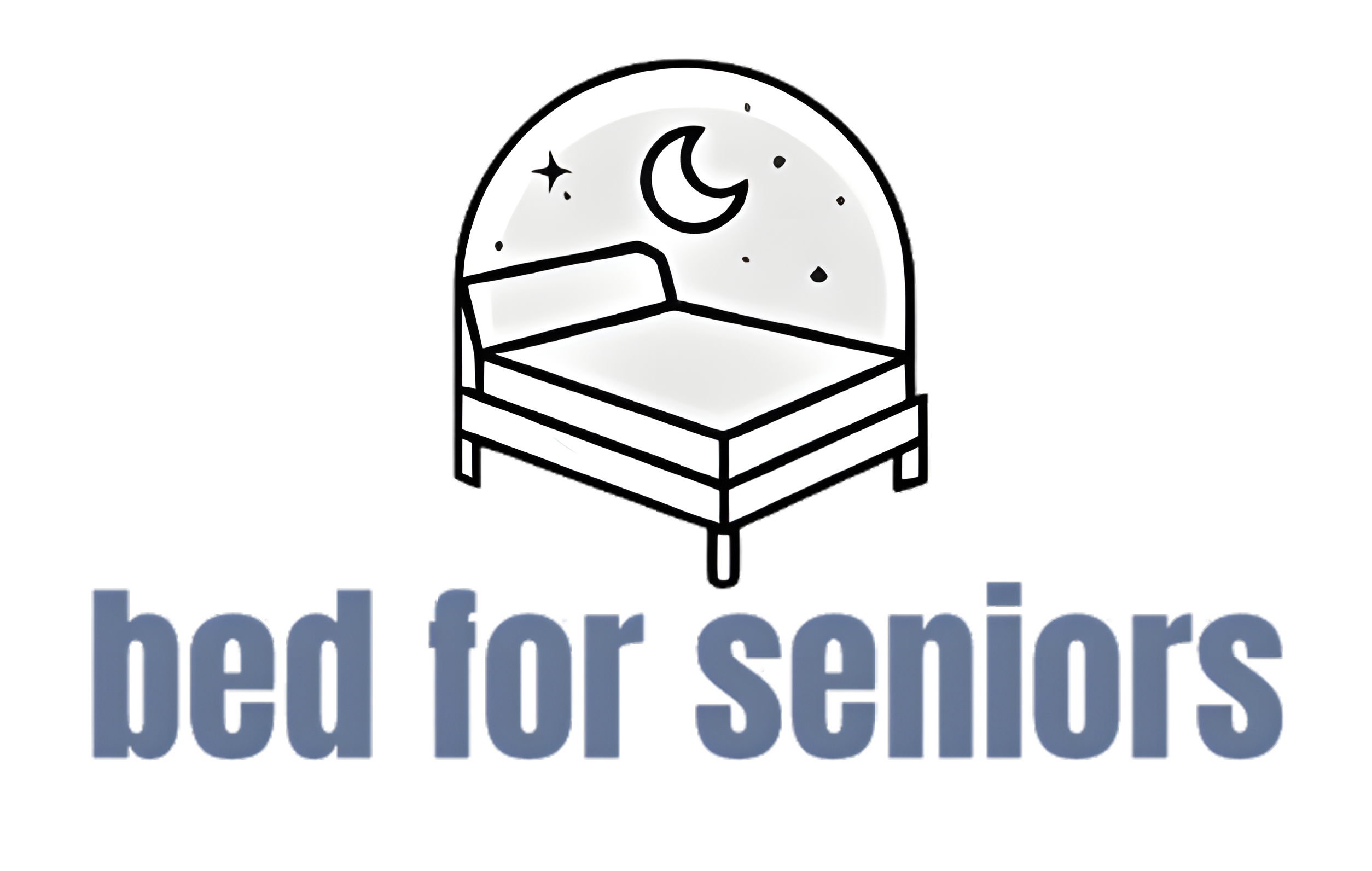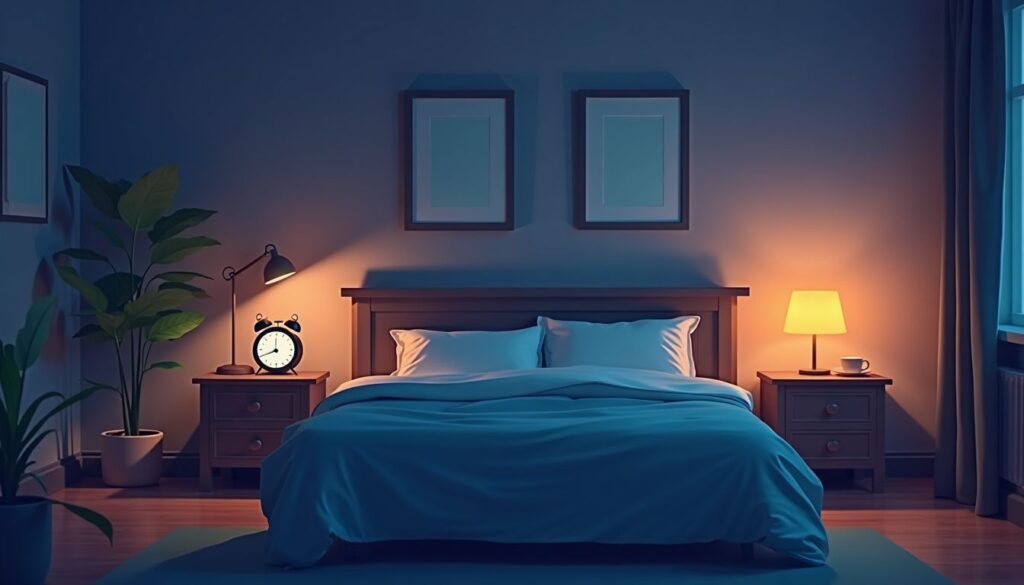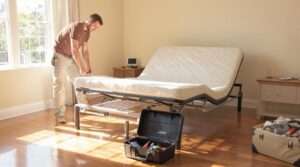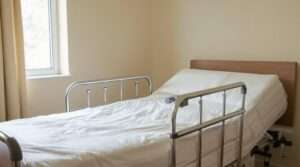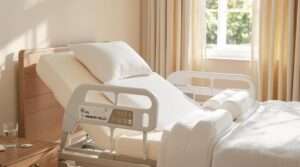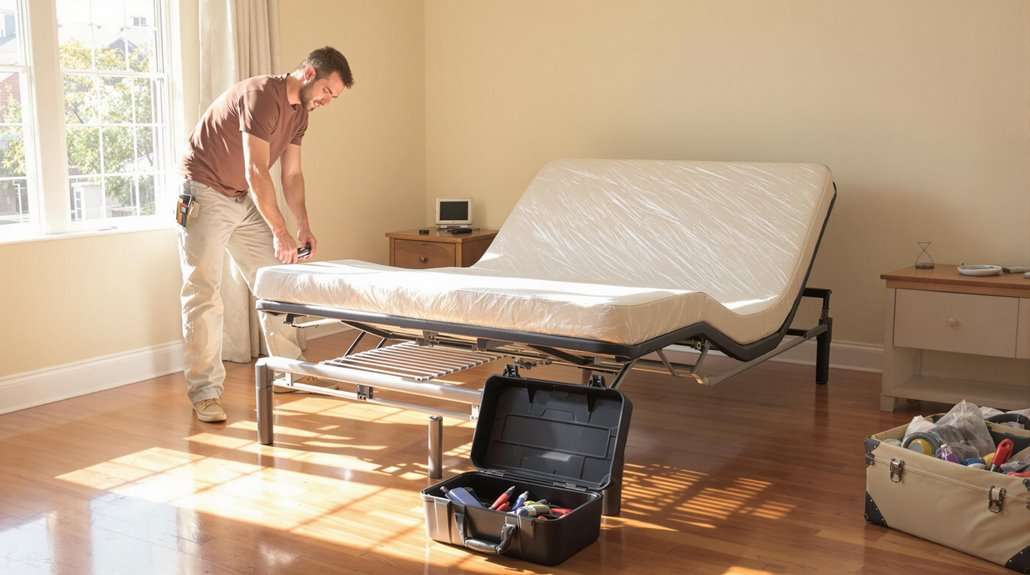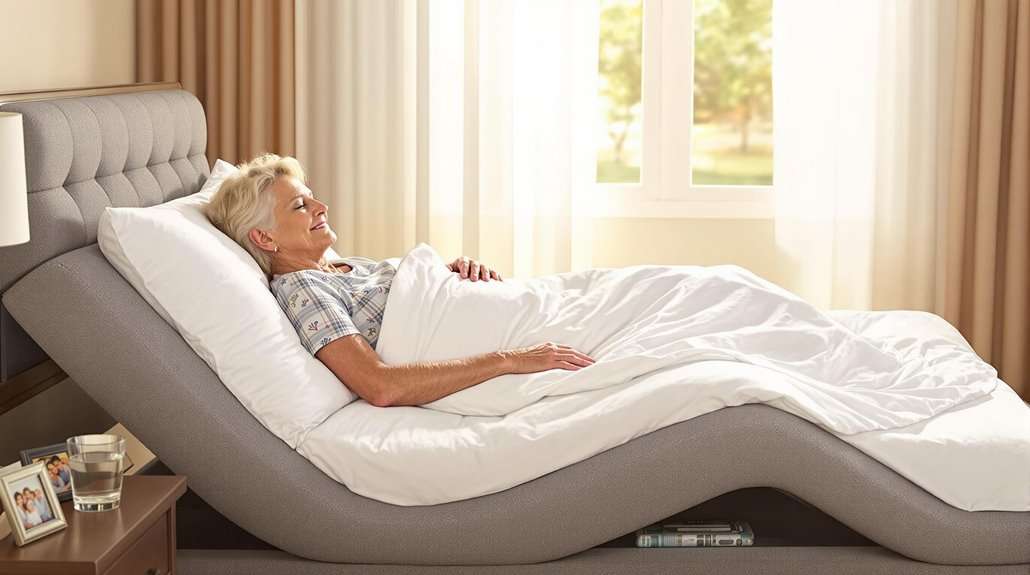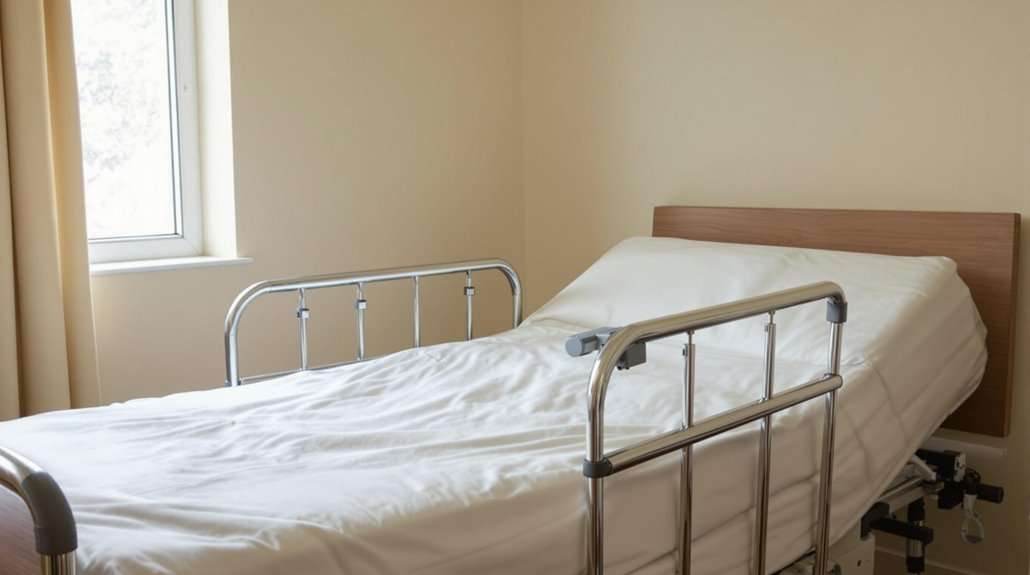Many people find it harder to sleep as they get older. Aging changes how we sleep, making it less deep and more broken up. Our blog will show you ways to manage these changes for better rest.
Keep reading for helpful tips.
📋✅
- As people get older, they sleep less and wake up more often at night. Their deep sleep decreases, making rest less refreshing.
- Older adults have a harder time falling asleep because of changes in their body like less melatonin and growth hormone.
- Health problems, emotional stress, and living environment also affect how well older people sleep.
- About half of elderly people report poor sleep due to issues like insomnia and sleep apnea.
- To improve sleep, creating a comfortable bedroom, keeping a regular bedtime schedule, and managing naps help.
Overview of Age-Related Changes in Sleep Patterns

As we age, our sleep patterns shift. You might find it harder to fall asleep or stay asleep through the night.
Sleep duration decrease
People sleep less as they get older. Studies show a drop in total sleep time by 10-12 minutes every ten years. After age 60, this decrease levels off. So, someone who used to sleep for eight hours might find themselves getting only seven or fewer hours of rest each night by the time they are 60.
This change in sleep patterns is common among older adults.
Despite these changes, older adults often don’t have trouble starting to sleep. The real issue lies in how long they stay asleep and the quality of that sleep. Their nights may be shorter with more wake-ups than when they were younger.
This fact means caregivers need to understand these shifts in patterns to help manage them effectively.
Sleep initiation difficulties
Aging makes it harder to fall asleep. Studies show that after 50, people take longer to start sleeping. This change gets more noticeable with each year. A model shows sleep trouble starts in the late teens to twenties, stays the same from 30 to 50, then increases steadily after 50.
This problem is part of why older adults often feel they don’t get enough rest. It leads us into how deep sleep and REM sleep change as we age, affecting our overall health.
Changes in sleep efficiency
After dealing with trouble falling asleep, older adults face another challenge. Their sleep efficiency drops significantly after age 60. This means they stay awake more at night and have more awakenings than when they were younger.
In fact, older people wake up 2.7 times more often during the night compared to younger folks.
This happens because their deep sleep stage gets shorter. Light sleep takes over most of the night, making their rest less refreshing. Plus, getting back to sleep after waking up is harder for them.
These changes make good sleep hard to come by as one ages, impacting overall health and mood.
Alterations in sleep maintenance and stages
Older adults wake up more often during the night. Studies show they stay awake longer after first falling asleep. This is called increased wake duration after sleep onset (WASO). A report found that WASO grows by 10 minutes every decade from age 30 to 60.
It then stays the same after age 60.
Deep sleep gets less with age too. Older people have more stage 1 and stage 2 non-rapid eye movement (NREM) sleep instead of deep, restful phases. Research says REM sleep drops by 0.6% every ten years until someone is between ages 19 to 75.
But, there’s a small increase in REM sleep from ages 75 to 85.
Impact of Aging on Circadian Rhythms
As we get older, our body clocks—that help us sleep—change, making it harder to keep a regular sleep pattern. Want to know more? Keep reading!
Phase advance in sleep cycles
Older adults often feel sleepy earlier in the evening. They wake up earlier too. This is because of phase advance in their sleep cycles. Their internal clock changes, making them go to bed and rise with the sun more than they used to.
This shift leads to less night sleep. Yet, it disrupts their daytime naps as well. It’s part of why many older people have trouble staying asleep at night. They may also find it hard to take a nap during the day, even if they are tired.
Reduction in circadian rhythm amplitude
After a phase advance in sleep cycles, we see a drop in circadian rhythm strength. This means the body’s internal clock doesn’t signal as loudly or clearly as before. The suprachiasmatic nucleus (SCN) is key here—it controls 24-hour rhythms.
With age, its function declines. This weaker signaling affects sleep-wake patterns. It makes adjusting to new sleep times harder.
For example, older adults might find it tough to adapt after traveling across time zones—more so than younger people. Think of it like a dimmer switch on lights; the SCN’s control dims with age, making clear day-night signals fuzzy.
Hence, maintaining regular sleep becomes challenging without those strong cues from our biological clock.
Challenges in adjusting to phase shifts
Older adults often face trouble with phase shifts, like dealing with jet lag or shift work. Their bodies find it hard to adjust when their sleep schedule changes quickly. For example, flying across time zones can throw off their internal clock.
They might stay awake at night and feel sleepy during the day.
This difficulty is due to less flexible circadian rhythms in older people. Circadian rhythms are like an internal clock that tells our bodies when to sleep and wake up. As we age, this clock does not change as easily as it used to.
So, older adults have longer periods of staying awake after they try to sleep (WASO) and more moments of waking up at night. This makes adjusting to new sleep times very hard for them.
Influence of Sleep-Related Hormones on Aging
As we age, our body’s production of sleep-related hormones like melatonin and growth hormone drops. This decrease affects how well we sleep at night, making it harder to stay asleep and impacting our overall health.
Decline in growth hormone and melatonin levels
Growth hormone makes us sleep deeply. Melatonin tells our body it is time to sleep. As people get older, their bodies make less growth hormone and melatonin. This change can mess up how they sleep.
They might find it hard to fall asleep or stay asleep all night.
Doctors see this a lot in older adults. Less growth hormone means less deep sleep. Less melatonin can make sleeping at the right times harder. These changes are part of why older people might wake up early or have trouble sleeping through the night.
Variations in cortisol and thyroid-stimulating hormone
As people get older, their bodies change in many ways. One major change is how certain hormones act. Cortisol and thyroid-stimulating hormone (TSH) are two hormones that behave differently as we age.
For older adults, stress hormone patterns shift, leading to lower daytime levels and higher levels at night. This can mess with deep sleep stages.
Another thing to note is the overall TSH release over 24 hours decreases in older people. Since TSH helps control your energy levels, changes can impact how well you sleep at night and feel during the day.
These shifts play a big role in aging and sleep problems among the elderly.
Effects of reduced sex hormones
Changes in sex hormones impact sleep. For men, lower testosterone levels lead to sleep troubles. In women, drops in estradiol during menopause cause similar issues. These changes can make falling asleep hard and disturb sleep through the night.
About 20% of older adults face excessive daytime sleepiness (EDS). This condition often ties back to shifts in hormones like testosterone and estradiol. It raises risks for problems with thinking and heart health.
Common Sleep Disorders in Older Adults
Older adults face more sleep problems, like insomnia and sleep apnea. These issues can make nights tough and days long.
Increased incidence of insomnia
Half of older adults say they don’t sleep well. Many wake up often and stay awake long into the night. This problem is called insomnia. It makes life hard for many people as they get older.
Doctors see more cases of insomnia in these adults. They find it tough to fall asleep and can’t stay asleep either. These sleep issues are serious, affecting their health and daily lives.
Prevalence of sleep apnea
Many older adults face sleep apnea. This condition causes breathing to stop and start during sleep. It leads to fragmented sleep and low oxygen levels in the blood. Studies show that it’s common among the elderly because of how their body changes with age.
Doctors use tools like sleep studies to diagnose this issue. During a study, patients spend the night at a clinic while machines track their breathing, heart rate, and more. These tests help find out if someone has sleep apnea.
Next, we’ll talk about Restless Legs Syndrome and its impact on sleep.
Restless Legs Syndrome and its impact
Restless Legs Syndrome (RLS) affects many older adults. It makes their legs feel like they need to move, especially at night. Because of this, sleep quality goes down. A lot of people with RLS say they don’t sleep well.
This condition leads to more than just tiredness. People with RLS often find it hard to fall asleep or stay asleep through the night. This means they may not get enough rest, which can affect their health and daily life.
External Factors Affecting Sleep in Older Adults
Older adults often face sleep challenges due to health issues, emotional stress, and changes in their living places. Keep reading to learn how these factors play a role.
Medical and psychiatric conditions
Health issues like heart disease and diabetes change how well older adults sleep. These medical conditions can make sleep worse by causing pain or making it hard to stay asleep. For example, people with heart disease might wake up often during the night.
Those with diabetes may need to go to the bathroom more at night.
Mental health also plays a big role in sleep. Conditions such as depression are linked with trouble sleeping among elderly folks. Anxiety can make it hard for them to fall asleep or cause them to wake up too early and not be able to get back to sleep again.
Socio-environmental factors and lifestyle changes
Moving beyond medical and psychiatric conditions, we see how daily life impacts sleep in older age. Temperature, noise, and light exposure play big roles in sleep quality for the elderly.
Too hot or too cold rooms can disrupt sleep. Loud sounds and bright lights make falling asleep hard.
Physical activity affects sleep too. Older people who move less during the day may find it harder to fall asleep at night. Being alone a lot can also make sleeping difficult. Friends and family help keep a regular sleep-wake cycle.
Without them, older adults may face more nighttime wake-ups or trouble getting to sleep.
Are Sleep Problems Common in the Elderly?
Yes, sleep problems are common in the elderly. About half of older adults say they have poor sleep. This often comes from health issues. Health plays a big role in how well seniors rest at night.
A study shows that even healthy seniors can have trouble sleeping. Around 33% of women and 16% of men over 65 face these challenges despite feeling fine during the day. Sleep disorders like insomnia and sleep apnea hit this age group hard.
Next, let’s explore practical tips for managing sleep patterns as we get older.
Practical Tips for Managing Sleep Patterns in Aging
For a better night’s sleep, setting up a quiet and dark place to rest can work wonders. Sticking to the same bedtime and wake-up time every day also helps keep your body’s clock on track.
Creating a sleep-conducive environment
To make a room good for sleep, keep it cool, quiet, and dark. Use heavy curtains or shades to block light. This helps with sleep regulation. Also, cut down on noise. If needed, use white noise machines or earplugs to keep sounds out.
Keep the room’s temperature between 60 and 67 degrees Fahrenheit for best sleep.
Add comfortable bedding and pillows that support good sleep postures. Remove TVs, computers, and other electronics from the bedroom to avoid distractions. Make sure the mattress supports well without causing discomfort or pain during rest periods,.
Lastly, limit light exposure before bedtime to maintain your circadian rhythm—avoid bright screens an hour before sleeping—this tactic aids in falling asleep faster and experiencing deeper rest stages throughout the night.
Importance of maintaining a regular sleep schedule
After making the sleeping area better, it’s key to have a regular sleep schedule. This steadies the body’s internal clock and helps sleep get better. Good sleep habits, like going to bed and waking up at the same times every day, can make a big difference.
They help regulate the circadian rhythm which improves how well someone sleeps.
Avoiding naps during late afternoons or evenings is also important because they can make falling asleep at night harder. Keeping track of how much time one spends in bed awake should be minimal; this ensures that the body associates being in bed with sleeping rather than being awake.
Lastly, managing daytime tiredness by staying active during daylight hours helps ensure a good night’s rest when it’s finally time to sleep.
Recommendations for napping and managing daytime sleepiness
Set a nap schedule. Keep naps short, 20-30 minutes, to avoid sleep troubles at night. Early afternoon is best for napping. This helps with the body’s need for rest without ruining nighttime sleep.
Watch for signs of too much daytime sleepiness in older adults. If they’re often sleepy during the day, it could mean poor sleep quality or health issues. Regular, short naps help but look into any bigger reasons behind tiredness if it’s a constant issue.
Aging changes how we sleep. Older people sleep less at night and wake up more often. Their bodies also make less of some hormones that help with sleep. Yet, many do not feel their sleep is bad.
To cope, they can fix their bedrooms for better sleep and keep a regular bedtime. Good habits help manage these changes in sleep patterns as we age.
For more insights on sleep challenges among older adults, visit Are Sleep Problems Common in the Elderly?.
Related Questions
1. How does the aging process affect sleep patterns?
As we age, our circadian system changes and can disrupt our sleep-wake cycle. This could lead to common issues like difficulty falling asleep, nighttime urination, and inadequate rest.
2. What are some common sleep disturbances experienced by older adults?
Older adults often experience disrupted sleep due to conditions such as obstructive sleep apnea, periodic limb movement disorder (PLMD), REM sleep behavior disorder, and frequent nighttime urination. These issues can cause inadequate rest and chronic feelings of tiredness.
3. Can health conditions related to aging impact one’s quality of sleep?
Absolutely! Chronic pain from conditions like cardiovascular disease or cancer can interrupt slow-wave or non-rapid-eye-movement (NREM) stages of sleep leading to a lack of deep restful slumber. Postmenopause in women may also trigger hot flashes causing disturbed nights.
4. Is there a connection between psychiatric problems and poor sleeping habits in older people?
Yes! Psychiatric problems such as Alzheimer’s disease or bipolar disorder often come with associated sleeping disorders that include insomina symptoms, hypersomnia or fragmented NREM phase which contributes significantly towards irregular sleeping patterns.
5. How do lifestyle factors influence the quality of an elderly person’s slumber?
Factors like social isolation might contribute towards disrupted timing of their sleeps; siesta – an afternoon nap popular among seniors could interfere with night-time sleeps too!
6.What recommendations are given by National Sleep Foundation for bettering senior citizen’s sleeps?
The National Sleep Foundation emphasizes on maintaining good “sleep hygiene” which includes regularizing the individual’s daily routines involving bedtime & wake-up time along with creating conducive environment for peaceful rests.
